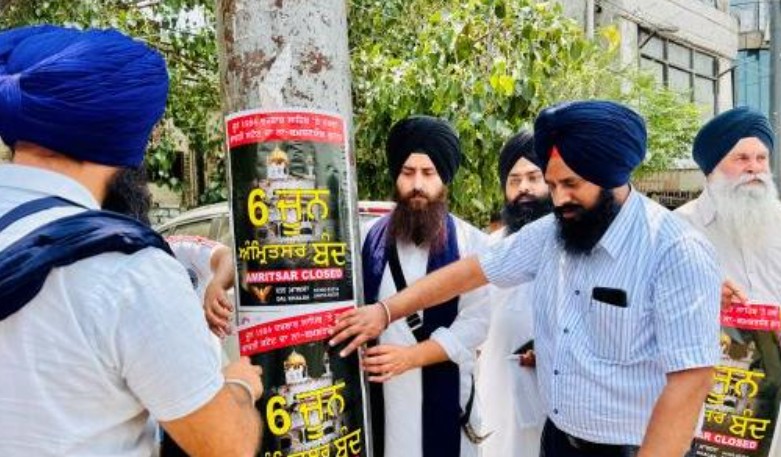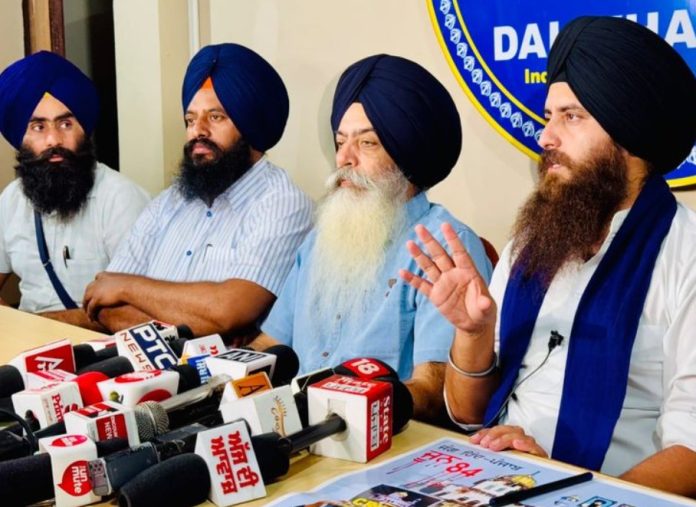Amritsar, Punjab – In a deeply poignant and annually recurrent observance that resonates profoundly within the Sikh collective consciousness, the Dal Khalsa, a prominent organization advocating for Sikh sovereignty, has once again issued a powerful and dual call to action: a Ghallughara memorial march on June 5 and a subsequent Amritsar bandh (shutdown) on June 6. These meticulously planned events are orchestrated to solemnly commemorate the 41st anniversary of Operation Bluestar, the devastating military assault on the holiest Sikh shrine, Sri Harmandir Sahib (Golden Temple), and Sri Akal Takht Sahib, which unfolded in the fateful first week of June 1984.
The formal announcement, articulated by Dal Khalsa working president Paramjit Singh Mand and spokesperson Kanwar Pal Singh on Wednesday, May 29, 2025, underscores the enduring pain, the raw emotional wounds, and the myriad of unresolved questions that continue to besiege the Sikh community globally, stemming from an event that remains an indelible and agonizing scar on their historical narrative.
For Sikhs across the world, “Ghallughara” is a term deeply steeped in historical tragedy and collective suffering, directly translating to a “great massacre” or, more emphatically, a “holocaust.” While this term historically referred to two major massacres of Sikhs in the 18th century, it has, since June 1984, become inextricably linked with Operation Bluestar, often reverently and painfully referred to as the “Third Ghallughara” (Teeja Ghallughara). This military operation, executed under the direct orders of then-Prime Minister Indira Gandhi, was ostensibly aimed at flushing out Sikh militants led by Jarnail Singh Bhindranwale from within the sacred confines of the Golden Temple complex.

The week-long assault, which tragically commenced on June 1, 1984, and devastatingly culminated on June 6, inflicted catastrophic damage upon the revered Akal Takht Sahib, the supreme temporal seat of the Sikhs, and other sacred structures nestled within the complex. Furthermore, it led to a tragic and substantial loss of life, including numerous innocent pilgrims caught in the devastating crossfire. For countless Sikhs, this audacious and unprecedented attack represented an unforgivable desecration of their holiest shrine and a profound assault on the very essence of their faith, identity, and collective dignity, leaving an indelible scar that continues to shape their historical narrative, religious observances, and underlying political aspirations to this very day.
The Ghallughara memorial march, meticulously scheduled for the evening of June 5, is conceived not as a confrontational protest but as a profoundly peaceful and solemn procession. Its core purpose is to devoutly remember and honor those who tragically perished during the brutal intensity of Operation Bluestar and to emphatically reaffirm the community’s unwavering resolve to never forget the immense sacrifices made.
The march is anticipated to commence from Gurdwara Burj Akali Phoola Singh, a site imbued with deep historical significance within Amritsar, and is expected to proceed with dignity through several major arteries of the city, including the bustling Bus Stand area, the historic Ram Bagh, and the vibrant Hall Bazaar, before reaching its culmination at the hallowed grounds of Sri Akal Takht Sahib within the majestic Golden Temple complex. At this sacred destination, special prayers (Ardas) will be performed with utmost reverence to pay homage to the countless martyrs.
Dal Khalsa has formally extended an earnest invitation to various prominent Sikh organizations and diverse Akali factions, including the Akali Dal (Amritsar) led by the venerable Simranjit Singh Mann and the Panth Sewak Jatha led by Bhai Daljit Singh, encouraging their participation in what is envisioned as a unified and impactful display of remembrance and solidarity. The organizers consistently emphasize the march’s reflective and somber nature, aiming solely to honor historical memory and seek justice without any intention of inciting unrest or public disorder.
The following day, June 6, will witness the concerted observation of an Amritsar bandh, which entails a fervent call for a complete and voluntary shutdown of commercial establishments across the entire city. This bandh, as unequivocally articulated by the Dal Khalsa leadership, is intended as a profound mark of protest, remembrance, and solidarity. It is not merely a call for disruption but a deeply symbolic act designed to reflect the community’s profound and enduring pain and its unwavering demand for justice concerning the cataclysmic events of 1984.
The organization has earnestly appealed to the city’s diverse residents, extending their request even to non-Sikh communities, to cooperate by keeping their shops, markets, and businesses voluntarily closed for the day. This collective act of voluntary closure, they firmly believe, will allow all segments of society to genuinely share in the “pain through which the Sikh community has been passing for the last four decades.”
Dal Khalsa spokesperson Kanwar Pal Singh underscored the raw immediacy of their collective grief, asserting that “the pain of the deadly attack was fresh and the wounds still simmer. Forgetting assault on Sikh faith was not possible.” The bandh also serves as a poignant protest against the alleged egregious looting of invaluable manuscripts, ancient scriptures, and precious artifacts from the sacred Sikh Reference Library during the army operation—a colossal and irreparable loss that continues to be profoundly felt by Sikh scholars, historians, and the wider community.
In light of the highly sensitive and emotionally charged nature of these annual observances, the police forces and the local administration in Amritsar are, as per established protocol, expected to be on an elevated state of alert. Comprehensive security measures will undoubtedly be significantly enhanced around the revered Golden Temple complex and along the proposed routes of the memorial march to ensure the peaceful conduct of both events and to proactively prevent any potential untoward incidents.
While the Dal Khalsa has consistently emphasized the non-violent, peaceful, and purely symbolic nature of their calls for remembrance, governmental authorities typically maintain a highly visible and robust presence to effectively manage large crowds, mitigate any potential flashpoints, and ensure the smooth flow of daily life outside the specific protest zones. The state government, in its publicly stated commitment to meticulously maintaining law and order, will almost certainly monitor the entire situation with utmost vigilance, striving to carefully balance the fundamental constitutional right to peaceful protest and remembrance with the paramount imperative of safeguarding public safety and tranquility.
For the Sikh community at large, the searing memory of June 1984 remains an enduring and deeply emotional scar, a wound that forty-one years later, continues to fester. The annual remembrance events are not merely perfunctory historical commemorations but constitute a fundamental and integral aspect of their collective identity, their historical consciousness, and their unyielding quest for justice and the recognition of past wrongs.
Many Sikhs harbor a profound sense that the perpetrators of the violence and atrocities of that period, including those responsible for the subsequent horrific anti-Sikh riots of October-November 1984, have yet to be fully and justly held accountable. This pervasive sentiment of unaddressed grievances unequivocally fuels the widespread participation in memorial marches and bandhs, serving as a constant and powerful reminder to both the government and society at large that the profound wounds of the past are far from healed and demand ongoing acknowledgment and resolution.
While there may exist varying perspectives within the broader Sikh community regarding the specific methods or intensity of protest or remembrance, the core sentiment of collective grief, profound historical trauma, and an unwavering demand for justice remains universally and deeply shared. The Dal Khalsa’s consistent call for a memorial march and a city-wide bandh is an integral component of a persistent pattern of activism and advocacy aimed at keeping the memory of Operation Bluestar vibrantly alive and at rigorously championing Sikh rights and long-standing aspirations.
Such deeply significant annual events frequently ignite broader, often uncomfortable, discussions about historical reconciliation, the appropriate limits of state power, and the complex and often volatile interplay of religion and politics within the unique fabric of Punjab. The organization’s leaders also seize these poignant opportunities to articulate their positions on contemporary issues, as they reportedly did by asserting that “war was not in anybody’s interest” and by critically referencing the ongoing, often tense, geopolitical dynamics between India and Pakistan.
They fervently advocate for the cessation of escalating hostilities and the unfettered opening of borders for pilgrims, specifically citing the crucial Kartarpur corridor. In doing so, they draw poignant parallels between what they perceive as misguided military solutions to fundamentally political problems in the past (like the situation in Punjab in 1984) and current geopolitical impasses. This consistent linkage unequivocally demonstrates their enduring and unwavering stand on broader geopolitical issues that profoundly impact the peace and stability of the region.
The annual solemn observation of Ghallughara is, therefore, a powerful and undeniable reminder of the enduring and pervasive legacy of the tumultuous events of 1984. It profoundly signifies that despite the passage of more than four decades, the profound pain, the collective trauma, and the unyielding yearning for comprehensive justice continue to persist and resonate within the Sikh community.
These highly charged events serve as a sensitive barometer of prevailing Sikh sentiments and contribute significantly to the ongoing historical discourse surrounding that pivotal and painful period. For the vast Sikh diaspora scattered across the globe, too, the specific dates of June 5 and June 6 hold immense and profound significance, often observed with solemn ceremonies, vigils, and organized protests in various international cities.
The Dal Khalsa’s consistent and persistent efforts ensure that the deeply etched narrative of 1984 is neither conveniently forgotten nor unjustly trivialized, serving as a poignant and perpetual reminder of the complex challenges that continue to shape the intricate political and religious landscape of Punjab and, indeed, the wider global Sikh world. The successful, peaceful, and dignified execution of these carefully planned events will undoubtedly be a resounding testament to the Sikh community’s unwavering resolve and the administrative authorities’ crucial ability to adeptly manage highly sensitive historical commemorations within a meticulously maintained framework of law and order and mutual respect.


